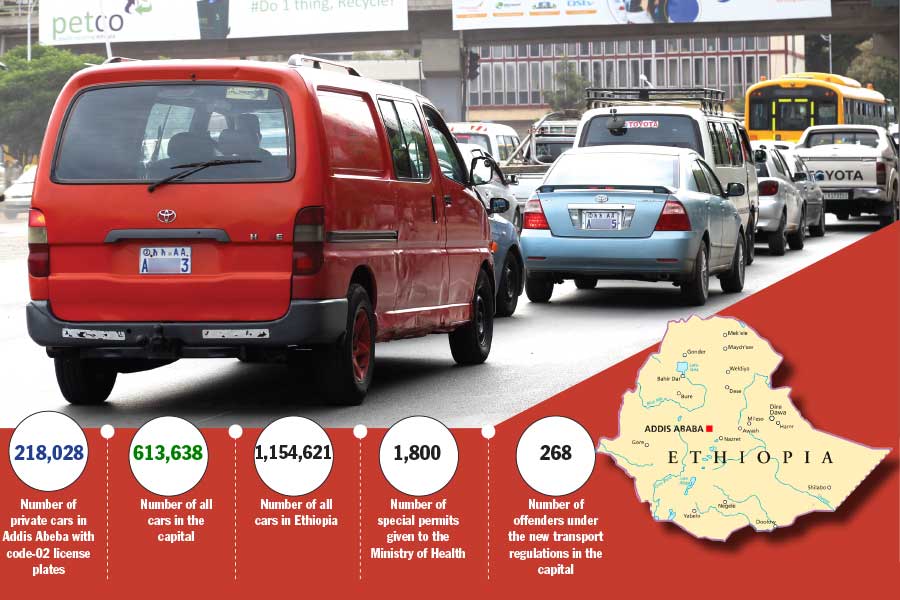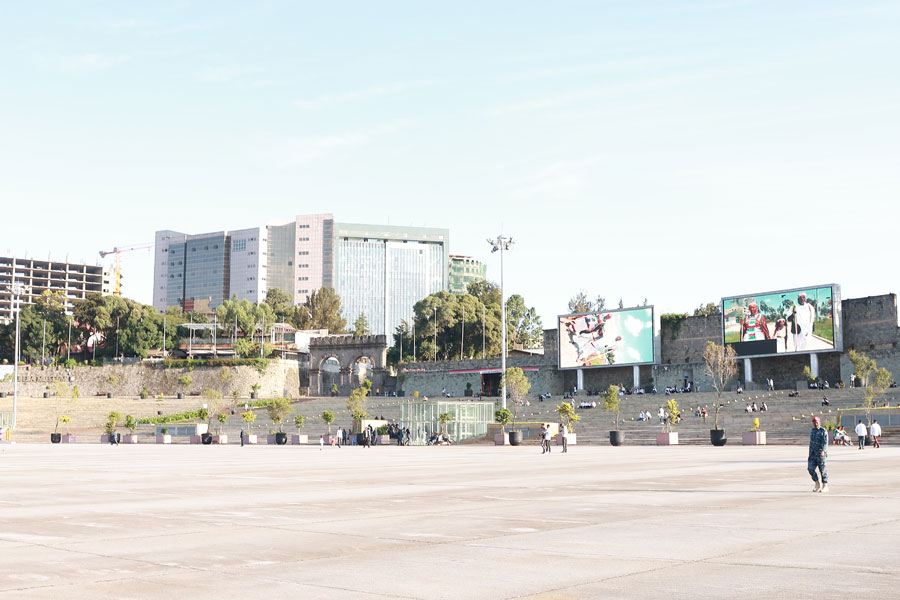
Editorial | Jul 12,2025
Feb 24 , 2024.
The recent policy pronouncement by the Transport Minister, Alemu Sime (PhD), of a plan to ban the import of petroleum-powered vehicles for personal use has sparked a debate, if not anxiety. However, it touches upon the essence of governance, policymaking, and the marriage of ambitious policy goals with the socio-economic realities.
Alemu’s desire, ostensibly aimed at his administration’s resolve to promote a green economy and curtail foreign currency expenditure on fuel imports, uncovers a disjunction between high-reaching policy shifts and the practicalities. Ethiopia's attempt to leap towards green transportation, inspired by European precedents like Norway's impending ban on internal combustion vehicles by 2025, should raise critical questions about the feasibility and readiness of such a policy in the Ethiopian context.
Norway's considerable electric power generation capacity, nearly 30-fold greater than Ethiopia's less than 5,000mw, which serves a 20-time smaller population, provides a solid foundation for such a transition. In contrast, where over half the population lacks electricity access, Ethiopia faces a shortage of electric car charging stations and a broader scarcity of transportation options.
This policy shift, if pursued in full force, while noble in intent, appears to be more of a hopeful emulation than a pragmatic strategy, reflecting a broader trend of aspirational policymaking that overlooks the practical limitations inherent in Ethiopia.
The educational sector reforms, as described by Education Minister, Brehanu Nega (Prof), aiming to shift towards a "Scandinavian-esque" system, further exemplify this trend. Inspired by Finland's success in education, the reforms attempt to replicate its play-based learning approach and increase leisure for school children. However, they overlook critical disparities in infrastructure, teacher qualifications, and resource availability between Finland and Ethiopia.
The discrepancy between the theoretical frameworks of policymaking and their practical application is not unique to Ethiopia but indicative of a broader issue in public administration. The attempts to embed evidence-based, inclusive, and participatory qualities in policymaking have often been impeded by structural incoherencies and political oversights.
The structural reforms to improve policy coherence and efficiency have been inconsistent, reflecting deeper problems in aligning policy development with implementation.
The chasm has become increasingly evident. Practitioners and policymakers alike steer through this divide often, armed with an understanding of what ought to be done, yet often find themselves hindered by the tangible application of these theories. The discrepancy uncovers the problems at the heart of governance, characterised by unrealistic process models, a lack of clarity on achieving desired policy qualities, structural incoherence amidst bureaucratic downsizing, and a tendency to sideline the political dimension of policy formulation.
The dominant models of policy formulation processes, revered in academic circles and policy manuals, often resemble shells — crafted for public consumption rather than practical application. Despite this, the government's attempts to refine policymaking have largely fallen short of bridging the gap. This should be particularly puzzling given the persistent reliance on these models by significant entities like the two ministries, which continue to anchor policymaking guidance in an idealised cycle, seemingly divorced from the realities of enforcement.
Ministers and civil servants concur on the government's proficiency in certain areas, yet acknowledge its shortcomings in others, like policy evaluation. The structural reforms undertaken, aiming at promoting a more strategic and evidence-based policy landscape, have yielded mixed results. While some initiatives have introduced fresh perspectives, the sustainability of these reforms is questionable.
Government offices often shift towards more flexible policymaking models during structural adjustments and budgetary constraints. However, the transition to such models has been marred by unresolved issues related to the inability to enforce. This introduces potential rifts between the policy developers and implementers, complicating the precarious situation.
The traditional approaches to policy reform have often neglected the link between policy and realism. While acknowledging the importance of the practicality dimension, the existing official attitude tends to portray it as a factor to be managed rather than as a core component of policymaking. A good illustration of this could be the abrupt and determined enforcement of a policy compelling gas stations to serve motorists only through digital payment platforms.
Nonetheless, such an oversight diminished the potential for a more nuanced understanding of the constraints and limitations the market experienced.
The exclusion of consumers and market forces from policy changes is a glaring omission, given their crucial role in the policymaking partnership with civil servants. The lack of formal evaluation mechanisms, alongside the absence of a framework outlining expected skills and behaviours, exacerbated the accountability and effectiveness issues within the policymaking process.
The quest for a more participatory policy process is both necessary and urgent. A reimagined approach that acknowledges governance's inherent difficulties and messiness while striving for adaptability should be imperative. Such an approach would align more closely with the principles of fairness in governance and enhance the government's capacity to respond to and shape policy in rapidly changing circumstances. The path forward requires a commitment to learning and adaptation, addressing systemic barriers, and embracing the relationship between policies – however well-meaning they may be – and the realities of citizens. Through such comprehensive reforms can the officials bridge the gap between the idealised visions of policymaking and the pragmatic demands of governing.
Adopting foreign policy models without adequate customisation and neglecting the dynamics in the policymaking process can only be a technocratic approach that overlooks the essential role of popular support and engagement. This has led to a gap between aspirational qualities and operational challenges.
By doing so, the authorities can enhance the effectiveness and sustainability of their reform efforts, ensuring that they truly reflect the unique context and capabilities of the country they run.
PUBLISHED ON
Feb 24,2024 [ VOL
24 , NO
1243]

Editorial | Jul 12,2025

Radar | Nov 20,2021

Radar | Dec 19,2020

Fortune News | Apr 25,2020

Fortune News | Oct 21,2023

News Analysis | Jul 03,2021

Radar | Dec 29,2018

Life Matters | Nov 23,2024

Fortune News | Dec 05,2018

Radar | Sep 26,2021

Photo Gallery | 180285 Views | May 06,2019

Photo Gallery | 170482 Views | Apr 26,2019

Photo Gallery | 161511 Views | Oct 06,2021

My Opinion | 137269 Views | Aug 14,2021

Dec 22 , 2024 . By TIZITA SHEWAFERAW
Charged with transforming colossal state-owned enterprises into modern and competitiv...

Aug 18 , 2024 . By AKSAH ITALO
Although predictable Yonas Zerihun's job in the ride-hailing service is not immune to...

Jul 28 , 2024 . By TIZITA SHEWAFERAW
Unhabitual, perhaps too many, Samuel Gebreyohannes, 38, used to occasionally enjoy a couple of beers at breakfast. However, he recently swit...

Jul 13 , 2024 . By AKSAH ITALO
Investors who rely on tractors, trucks, and field vehicles for commuting, transporting commodities, and f...

Nov 2 , 2025
The National Bank of Ethiopia (NBE) has scrapped the credit-growth ceiling that had s...

Nov 2 , 2025 . By SURAFEL MULUGETA
The burgeoning data mining industry is struggling with mounting concerns following th...

Nov 2 , 2025 . By YITBAREK GETACHEW
Berhan Bank has chosen a different route in its pursuit of a new headquarters, opting for a transitional building instea...

Nov 2 , 2025 . By BEZAWIT HULUAGER
Nib International Bank S.C. has found itself at the epicentre of a severe governance...